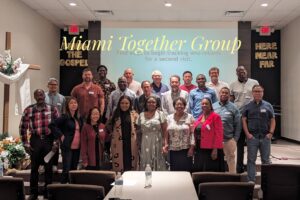When the thought of doing a residency was first proposed to me I was certain my family and I were not going to do it. I had already taken a year off from vocational ministry to rest and rejuvenate for the church planting season of my life. In our minds, my wife, Kayleigh, and I were eager to move and plant with no more delays. However, we humbled ourselves before the Lord, prayed about the residency being proposed to us, and I called the pastor of the church offering the residency. What was supposed to be a 15 minute phone conversation turned out to be almost two hours long and when we finally hung up, I realized God was redirecting us. Within two days, Pastor Corey Johnston of Heights Church already had a plan for our 9 months there and a couple inexpensive options for our living situation (turned out a family let us stay in their guest house for free). We had specifically been praying that wherever God wanted us to live next, He would provide affordable housing. We thought it would be in Manistee, Michigan where we originally thought we would plant a church. Turns out our next nine months would be in Troy, Illinois. “The heart of man plans his way, but the Lord establishes his steps” (Proverbs 16:9).
The reason we chose a residency with Heights Church all the way in Troy, Illinois is because my regional Converge Director, Norm Byers, had searched out Converge churches whose model of ministry fit closest to what Kayleigh and I are called to do with our church plant. We are very passionate about the Missional Community model that Soma Family of Churches does, and Heights Church was planted to follow this. Interestingly, when Norm first mentioned Heights Church to me, I knew of it because Pastor Corey’s philosophy of ministry paper was previously one of the examples Danny Parmelee emailed to me the year before to refer to as I wrote my own philosophy of ministry for my Converge Church Planting Assessment Center. Heights was the perfect fit for my family and I to do our residency.
Once Kayleigh and I knew God was calling us to do a residency with Heights, we knew we had to raise money fast and do a lot with our current house to get ready to leave for 9 months. We reached out to friends, family, and our local church where I had been a youth pastor for five years, and they stepped up in a huge way. Every month God provided exactly what we needed. The family that hosted us was incredibly generous, and I was thankful that I could use some of my landscaping experience to do a great deal of work on his yard to make it suitable for them to do foster care in the future. God knows exactly what He is doing and he put us in a situation where my “tent maker” skills and experiences played a huge role in being an alternative way for us to pay back some for our living space that was generously provided. We became great friends with the family as well. It’s too long and too wonderful to explain it all here, but every little detail God provided for our residency to happen proved over and over that God knows exactly what He is doing when He calls us to follow Him. His grace abounds abundantly where He directs our steps.
The residency didn’t just give us exposure to the Missional Community church planting model; we lived it! We really came to understand Missional Community as synonymous with Church. The Church by definition is a community on mission with the gospel of Jesus Christ, so really living week in and week out with people who genuinely believe that and are very gospel-fluent was refreshing and extremely exciting. We were part of one Missional Community at Heights for the first 5 months of our stay then the final four months we visited all the rest of them twice each, going to one or two a week while still visiting our own as time allowed. It was amazing how unique they all were and yet unified under the vision and the gospel. It takes about 3 months to really shift in mindset from Church as programs and events to identity through intentional gospel rhythms of life and mission but once that shift happened for us, everything we had researched and studying about missional community before came alive and made a lot more sense.
...the model of church we are passionate about wasn’t just theory anymore. It wasn’t just a great idea on paper for us anymore. It was real and we were living it.
A couple months in the realization hit both Kayleigh and I that the model of church we are passionate about wasn’t just theory anymore. It wasn’t just a great idea on paper for us anymore. It was real and we were living it. The gospel centrality, gospel unity, and gospel fluency we read about, wrote about, and craved so deeply was happening around us, in us, and through us. Words cannot express how much of a game changer our residency was for us. I had studied Soma Family of Churches and Jeff Vanderstelt’s ministry work for 3 years prior and even helped start a hybrid version of missional communities for a large church in transition, but the pieces I didn’t realize I was missing because I hadn’t lived it yet were significant. I thought I got it. I didn’t really get it until I lived it. And now Kayleigh and I feel so much more in tune with our vision and how the Lord has shaped us for the church we are called to plant.
Of course there were definitely humbling sacrifices we made. Firstly, having waited a year already to plant only to be led by God to take another year of preparation was particularly humbling for me, almost humiliating at times since the expectation around us was that we were launching soon. But it’s not about what others expect of you, it’s about where God is leading you and He knew we needed more preparation when we thought otherwise. Moving five hundred miles south to another state was also extremely humbling and overwhelming, especially since we went from living in a full size home that we own to a one room studio apartment above a garage with a kitchenette and small bathroom downstairs. My wife, my two year old daughter, and I along with our dog and cat all lived in one room for nine months, most of which were snow/rain winter months where we were stuck inside a lot. It was very hard but a blessing all the same. We realized how much stuff we had back home that we really don’t need, so the donation pile is growing each day now that we are back. Life was tight during our residency but it recalibrated our minds toward simplicity, and we couldn’t be more thankful for the breath of fresh air that is in a day burdened by possessions.
We weren’t the only ones impacted by the residency; Pastor Corey and many others told me how much of a blessing it was to have us there. Since Heights is a young church with Corey as the only seasoned preacher, having me preach gave Corey some breaks he really needed. I also met with Corey every single Tuesday morning for a couple hours just to talk, learn from, and sharpen one another in Christ. He has great elders and staff, but he told me my outside perspective helped him see many needs and changes to make Missional Communities better. We were able to serve our Missional Community, children’s ministry, and so much more during our time at Heights.
There are many forms of important training any church planter should invest in before being sent out to plant. Jesus’ disciples, although they had no formal training, basically did a residency with Jesus before He commissioned them. Whether you have formal training through seminary or, like me, have a wide variety of experiences under the leadership of others who trained you in ministry and in the Word, doing a residency specific to the model of church Christ is calling you to start is priceless and I highly recommend it.
A residency isn’t just a time to learn more about a certain church model you are passionate about. It is a time to grow spiritually and in the kind of character you’ll needed to plant a church. It’s a time to realize once again that apart from Christ and the work of the Holy Spirit, your vision is blind, your strategies are total garbage, and your mission will fail – or worse, it will succeed through carnal means and self-driven ambitions and lack of genuine spiritual vitality.
Looking back, it was mostly my pride that was initially against a residency. I was done waiting and thought I was as ready as I needed to be, that I really understood my vision, and that I didn’t really need to live it out before I planted a church. But I was wrong, and God knew there were things I needed to learn in my residency. Make no mistake, you are more prideful in yourself and dependent on your church planting ideas than you think. A residency isn’t just a time to learn more about a certain church model you are passionate about. It is a time to grow spiritually and in the kind of character you’ll needed to plant a church. It’s a time to realize once again that apart from Christ and the work of the Holy Spirit, your vision is blind, your strategies are total garbage, and your mission will fail – or worse, it will succeed through carnal means and self-driven ambitions and lack of genuine spiritual vitality. From a spiritual perspective, if you are absolutely opposed to doing a residency before you plant like I was, you need to spend some time with the Lord and ask Him to search your heart for why you are so opposed. If the answer is your pride then chances are you probably really need to do a residency or some kind of season of repentance and renewal from your idolatrous view of yourself and your ideas. Peter reminds us that “…God detests a prideful heart but gives grace to the humble…” (1 Peter 5:5-6).
One of my other prideful fears was that our residency may cause us to lose the wind in our sails and fall behind all of our assessment center friends who have since gone out and started planting already. Truth is, church planting is not a competition and we didn’t lose any wind in our sails. We are far more passionate and far more confident in God’s calling on our lives. It wasn’t a 9 month set back, but a leap forward. God will use our residency investment to multiply our ministry efforts in the future. That’s who God is. He is the Multiplier.
From a practical standpoint, if you are setting out to plant a church with a model you have never lived before under the leadership of another then I strongly recommend you find a church body that is doing what you want to do really well and go spend time with that church and immerse yourself. Your church planting dreams cannot just be a good idea on paper even if you’ve heard of other’s successes with it. It can’t just be something someone else you trust and admire has lived and done. It is invaluable for your vision to be something you’ve lived and done with others in some context. If you love Jesus and are a church planter, there are few things more encouraging than seeing what you’ve been praying about in action before you’ve even broken ground on your future church plant. It’s priceless and it’s precious. You also get to have a few good laughs as you see how some of your ideas were just plain stupid and, dare I say, unbiblical.
There are many ways God shapes a man and his family to be fruitful church planters; doing a residency is not the only way to go, much like going to seminary is not the only way to go. God trained me through other means, and one of those was a robust residency with a church five hundred miles from home and six hundred miles from where my family and I eventually want to plant a church.




